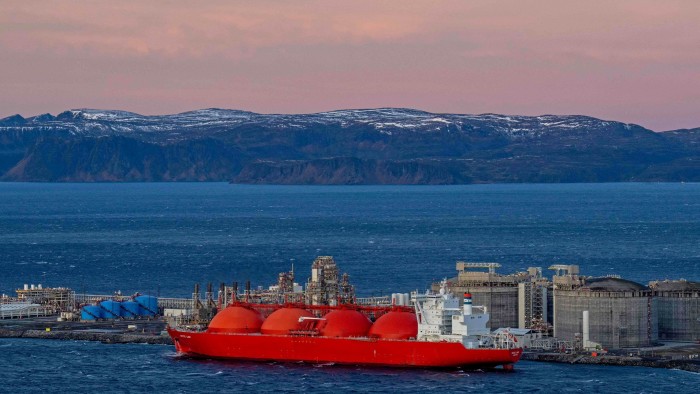Unlock the Editor’s Digest for free
Roula Khalaf, Editor of the FT, selects her favourite stories in this weekly newsletter.
Mitsui OSK Lines, the world’s second-largest shipowner, has struck back against calls by its rival AP Møller-Maersk to place a higher regulatory cost on the use of liquefied natural gas to power ships than zero-carbon fuels, highlighting divisions in the industry over how to decarbonise global trade.
Amid crunch talks this week at the UN’s International Maritime Organization, where diplomats are expected to agree an economic measure to tackle shipping emissions, the Japanese shipping line criticised proposals “differentiating between LNG and other low-emission options”.
The intervention by the Japanese shipping group comes after Danish shipowner Maersk warned IMO member states that proposals by some countries for a shipping emissions trading scheme did not sufficiently penalise those that use LNG. The fossil fuel emits up to a fifth less carbon than traditional bunker fuels but is significantly more polluting than green fuels.
“Until zero or near-zero fuels can be adopted on a wide scale, LNG is clearly a practical means for decarbonising shipping, given its availability, economic viability and safety,” said Takeshi Hashimoto, president of MOL.
The clash between these industry leaders underlines a broader split over how to cut shipping emissions, a debate that for years has divided some of the world’s largest economies during negotiations at the IMO, which industry leaders also attend and seek to influence.
With those discussions set to reach a head this week, delegates could agree the first ever global price for an industry’s carbon emissions, in a decision that could have implications for the future direction of climate regulations.
Attendees at the talks in London said there was a long way to go before a consensus could be found among member states. Those particularly exposed to climate change like the Pacific island nations have called for a levy as high as $100 to be imposed on every tonne of shipping’s carbon emissions, which environmentalists have argued is the simplest and most effective way to ensure low-carbon fuels are price-competitive soon.
Large exporters and ship-owning nations like China, meanwhile, have backed a trading scheme that would allow lower-emitting ships to sell credits to more polluting vessels.
IMO member states agreed in 2023 that shipping, which accounts for about 3 per cent of global emissions according to the OECD, should achieve net zero “by or around” 2050. Some shipowners including Maersk have invested in ships that can run on low-carbon fuels like green methanol, so are concerned about the high cost of these scarce fuels.
Much of the industry has avoided making similar investments, due to the high cost and availability of green fuels, and Maersk is concerned that if the IMO does not place a high cost on LNG, there will be no incentive to invest in developing green fuels.
More than two-thirds of the 515 alternative-fuel ships ordered in 2024 were LNG-powered vessels, according to shipping services group DNV. Methanol-powered ships represented less than a third of the total.
MOL, which last year had 873 vessels, is already more than a third of the way to achieving its target of a fleet of 90 LNG-fuelled ships by 2030.
Hashimoto, who did not directly mention Maersk, acknowledged the risk that shipowners could become dependent on fossil LNG. But he argued that the IMO could “incrementally escalate regulatory standards” to drive a transition to cleaner bio and e-LNG.
Maersk, in contrast, has cautioned the IMO against setting measures that would not immediately place a high enough cost on LNG to incentivise investments in low-carbon fuels, preventing the increase in supply that would in turn bring down the cost of these alternatives.
The shipowner, which itself has ordered LNG-fuelled ships, agreed that the fuel “has a role to play”, but added: “We do not consider LNG a low emissions option. It’s a fossil fuel.”
It has argued that cleaner versions of LNG cannot supply the whole industry, adding that “if the industry turns towards solely LNG, other pathways such as methanol and ammonia will not be developed to scale”.
